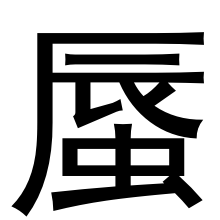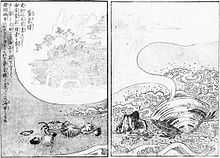Shen (clam-monster)
| Look up 蜃 in Wiktionary, the free dictionary. |
In Chinese mythology, the shen or chen (Chinese: 蜃; pinyin: shèn or chèn; Wade–Giles: shen or ch'en; literally: "large clam") is a shapeshifting dragon or sea monster believed to create mirages.
Meanings

Chinese classic texts use the word shen to mean "a large shellfish" that was associated with funerals and "an aquatic monster" that could change its shape, which was later associated with "mirages".
Large shellfish
The word used to mean a shellfish, or mollusk, identified as an oyster, mussel, or giant clam such as the Pearl of Lao Tzu. While early Chinese dictionaries treat shen as a general term for "mollusca", the Erya defines it as a large yao (珧) which means shellfish, clam, scallop, or mother-of-pearl. According to Shuowen Jiezi, an early 2nd century CE Chinese dictionary of the Han Dynasty defines it a large ge (蛤), meaning clam, oyster, shellfish, or bivalve.
Chinese classics variously record that shen was salted as a food (in Zuozhuan), named a "lacquered wine barrel" used in sacrifices to earth spirits (in Zhouli), and its shells were used to make hoes (in Huainanzi) and receptacles (in Zhuangzi). They also record two shen-compounds related with funerals: shenche (蜃車, with cart or carriage) "hearse" (Zhouli, Guo Pu's commentary notes shen means large shell-like wheel rims) and shentan 蜃炭 (with "charcoal") "oyster-lime; white clay", which was especially used as mortar for mausoleum walls (Zuozhuan, Zhouli).
Wolfram Eberhard (1968:292) describes the shen mussel as "a strange animal", and mentions the Zhouli's Zhangshen 掌蜃 "Manager of Shen", who was a special government official in charge of acquiring them for royal sacrifices and funerals. "It is not clear why these mussels were placed into the tombs," he admits, possibly either as a sacrifice to the earth god (compare shen 脤 below) or "the shell lime was used simply for a purifying and protective effect."
Edward H. Schafer, who aptly translates shen or chen as "clam-monster", traces its linguistic evolution from originally designating a "large bivalve mollusc",
Beginning as an unassuming marine invertebrate, the ch'en was later imagined as a gaping, pearl-producing clam, possibly to be identified with the giant clams of tropical seas, for instance Tridacna. Finally, by early medieval times, it had become a monster lurking in submarine grottoes, and was sometimes endowed with the attributes of a dragon – or, more likely, under influence, a nāga. It expressed its artistic nature by belching up bubbles and frothy clots. These foamy structures were sometimes worked into buildings. …The plastic exhalations of the clam-monster sometimes burst the film of surface tension and appeared to astonished mariners as stunning mansions adrift on the surface of the deep. (1989:395)
Aquatic dragon
Second, shen 蜃 meant the "clam-monster" that miraculously transformed shapes. The Shuowen jiezi defines ge 蛤 (using a graphic variant with the he 合 phonetic above the radical) as the "category of shen", which includes three creatures that transform within the sea. A que 雀 "sparrow" transforms into a ge 蛤, or muli 牡厲 "oyster" in Qin dialect, after 1000 (commentators say 10) years; a yan 燕 "swallow" transforms into a haige 海蛤 (with "sea") after 100 years; and a fulei 復絫, or fuyi 服翼 "bat", transforms into a kuige 魁蛤 (with "eminent") after it gets old. These kinds of legendary animal "transformations" – hua 化 "transform, change, convert, turn into; metamorphose; take the form of" (see the Huashu) – are a common theme in Chinese folklore, particularly for dragons like the shen. The "dragon's transformations are unlimited", writes Visser (1913:126), and "it is no wonder that Chinese literature abounds with stories about dragons which had assumed the shape of men, animals, or objects.
The Yueling 月令 "Monthly Commands" chapter of the Liji (6, tr. Legge 1885 I:292, 297) lists sparrows and pheasants transforming into shellfish during the traditional Chinese lunisolar calendar. In (Shuangjiang) the last month of autumn, "[jue 爵, a phonetic loan character for que 雀 "sparrow"] Small birds enter the great water and become [ge 蛤] mollusks", and in (Lidong) the first month of winter, "[zhi 雉 "pheasant"] Pheasants enter the great water and become [shen 蜃] large mollusks." While many other classical texts (e.g., Lüshi Chunqiu, Yi Zhoushu, Huainanzi) repeat this seasonal legend about pheasants that transform in dashui 大水 "great (bodies of) water; flood", the Da Dai Liji and Guoyu say they transform in the huai 淮 "Huai River." According to Chinese folklore (Visser 1913:69) swallows are a favorite food of both Chinese long 龍 and shen 蜃 dragons. Read (1934:301) explains, "Hence if people eat swallow's flesh they should not go out and cross a river (dragons will eat them if they do)."
Eberhard (1968:293) equates the shen 蜃 with the jiaolong 蛟龍 "flood dragon; crocodile" and compares tales of both these dragons attacking cattle in rivers. The 1596 CE Bencao gangmu Chinese materia medica describes the shen or chen 蜃 under the jiaolong entry, with quotes from the Yueling and Lu Dian's Piya.
A kind of crocodile shaped like a huge serpent. Horned like a dragon, with a red mane. Below the middle of the back it has scales inversely arranged. It lives on swallows. It spurts forth clouds of vapour in huge rings. It appears when it is going to rain. The fat and wax is made into candles which have a fragrant smoke noticeable 100 steps away, and ascend in layers in the air. The Yueh-Ling says the pheasant metamorphoses into a Ch'un [sic] when it enters the water. Lu Tien says that serpents and tortoises together produce tortoises but cohabitation of tortoises and pheasants produce Ch'un, although they are different animals they are moved by the same influences. Other records refer to its relationship to the clam. (43/5, Read 1934:315, cf. Visser 1913:76)
Mirage

The shape-changing shen is believed to cause a mirage or Fata Morgana. Shen- synonyms meaning "mirage" include shenlou 蜃樓 (with "multi-storied building", Schafer's 1989:396 "clam castle" or "high house of the clam-monsters"), shenqi 蜃氣 (with qi "breath; pneuma"), shenqilou 蜃氣樓, haishishenlou 海市蜃樓 (with "sea city/market"), and shenjing 蜃景 (with "scenery"). In Japanese vocabulary, shinkirō 蜃気楼 is the usual word for "mirage". Compare the association between the long 龍 "dragon" and "waterspouts", evident in words like longjuan 龍卷 (lit. "dragon roll") "waterspout" and longjuanfeng 龍卷風 ("dragon roll wind") "cyclone; tornado" (Visser 1913:220-224).
Characters
Most Chinese characters are written with a "phonetic" element that roughly indicates pronunciation with a "radical" or "signific" that suggests semantic field. Shen's standard 蜃 and antiquated 蜄 characters combine the chen 辰 "Dragon (zodiac), duodecimal 5th of the 12 Earthly Branches; period from 7-9 AM; time period; occasion; star; celestial body" phonetic with the chong 虫 "insect; reptile" radical.
A variety of other characters utilize this phonetic chen 辰 "5th; dragon", which the Wenlin says "may have depicted an ancient kind of hoe" in ancient oracle bone script (cf. nou 耨 "hoe; rake"). Some etymologically significant examples include:
- chen 晨 (with 日 "sun") "dragon star"
- zhen 震 (with 雨 "rain") "thunder; quake" (also a bagua trigram ☳ "The Arousing")
- zhen 振 (with 扌"hand") "shake; stimulate"
- zhen 娠 (with "woman") "pregnant"
- shen 脤 (with 肉 "meat") "sacrificial meat"
This chen 晨 or chenxing 辰星 "dragon star" is an asterism in the traditional Chinese constellations, a morning star within the Azure Dragon that is associated with east and spring. Specifically, the "dragon star" is in the 5th and 6th lunar Twenty-eight mansions, with its xin 心 "Heart" and wei 尾 "Tail" corresponding to the Western constellations of Antares and Scorpius.
Etymologies
Carr (1990:144-145) etymologically hypothesizes that the chen < *dyən 辰 phonetic series (using Bernhard Karlgren's Old Chinese reconstructions) split between *dyən "dragon" and *tyən "thunder". The former words include aquatic shen < *dyən 蜃 "large shellfish; sea dragon", celestial chen < *dyən 晨 "dragon star", and possibly through dragon-emperor association, chen < *dyən 宸 "imperial palace; mansion". The latter ones, reflecting the belief that dragons cause rainfall and thunder, include zhen < *tyən 震 "thunder; shake", zhen < *tyən 振 "shake; scare", and ting < *d'ieng 霆 "thunderbolt".
Schuessler (2007:184, 459, 611) provides more refined reconstructions and etymologies:
- shen < *dəns 蜃 "'Clam, oyster' … 'some kind of dragon'."
- chen < *dən 辰 "The 5th of the Earthly branches, identified with the dragon … cf. 蜃 'some kind of dragon'", which might be an Austroasiatic loan from Vietnamese trăn or Mon klan "python".
- chen < *dən 晨 or 辰 "Time when life begins to stir: (1) 'early morning' … (2) "start of growing/agricultural season in the 3rd month; heavenly bodies that mark that time' … 'heavenly body', 'time'."
- zhen < *təns 振 or 震 "('To stir, be stirring':) 'to shake, rouse, quake' … 'to alarm, fear', 'scared', 'thunder', 'move'".
- zhen < təns 娠 "'Pregnant', 'become pregnant' … is derived from 'to shake, rouse, excite' (e.g., a grasshopper from hibernation, i.e., coming to life), hence lit. 'start stirring, moving' (of an embryo)."
Modern times
In the present day, the mythical shen "clam-monster" is best known through the everyday words for "mirage; illusion", typically Chinese haishishenlou 海市蜃樓, Korean shingiru 신기루 蜃氣樓, and Japanese shinkirō 蜃気楼.
One is used by the Second Mizukage in the manga series Naruto.
References
- Carr, Michael. 1990. "Chinese Dragon Names", Linguistics of the Tibeto-Burman Area 13.2:87-189.
- Eberhard, Wolfram. 1968. The Local Cultures of South and East China. E. J. Brill.
- Legge, James, tr. 1885. The Li Ki, 2 vols. Oxford University Press. ISBN 1-4191-6922-X
- Read, Bernard E. 1934. "Chinese Materia Medica VII; Dragons and Snakes" Peking Natural History Bulletin 8.4:279-362.
- Schafer 1989. "Fusang and Beyond: The Haunted Seas to Japan," Journal of the American Oriental Society 109.3:379-400.
- Schuessler, Axel. 2007. ABC Etymological Dictionary of Old Chinese. University of Hawaii Press. ISBN 0-8248-2975-1
- Visser, Marinus Willern de. 1913. The Dragon in China and Japan. J. Müller.